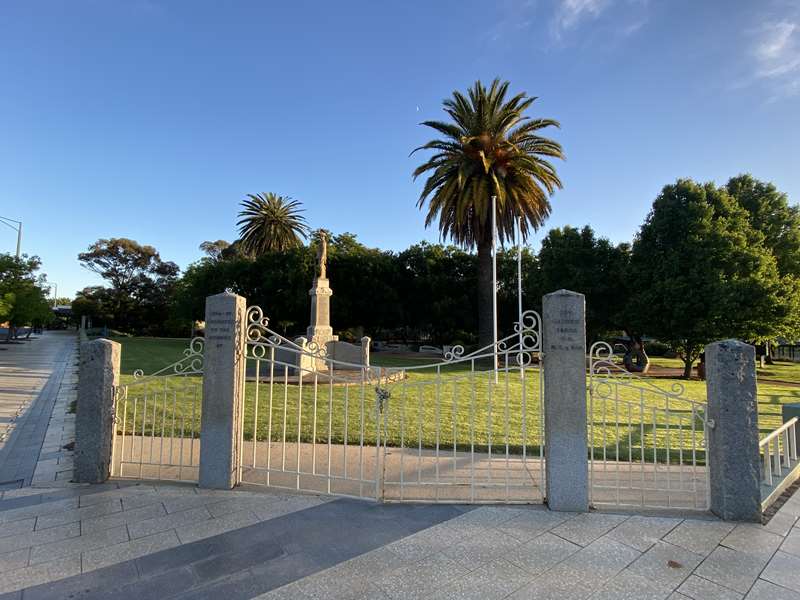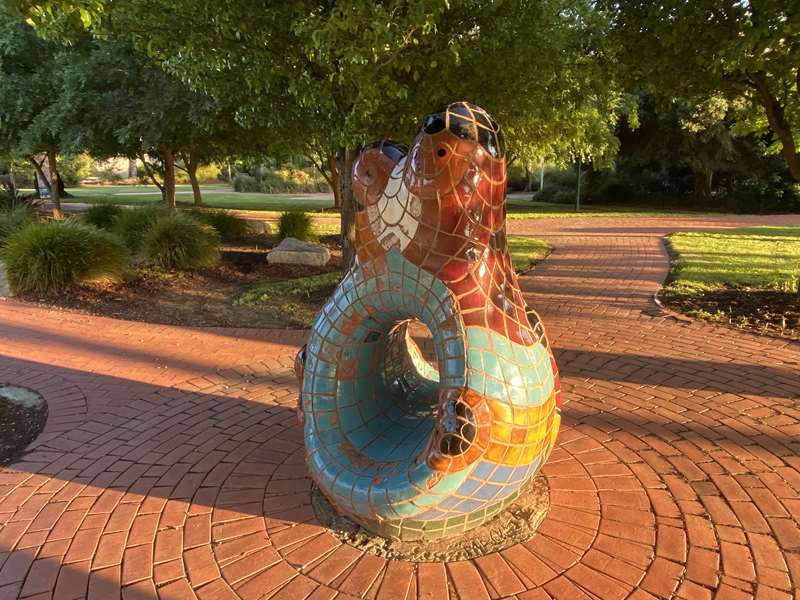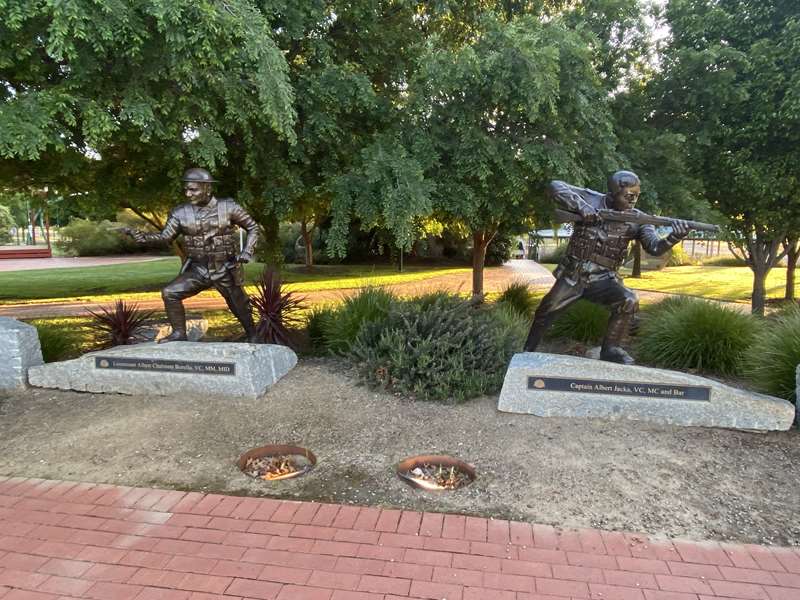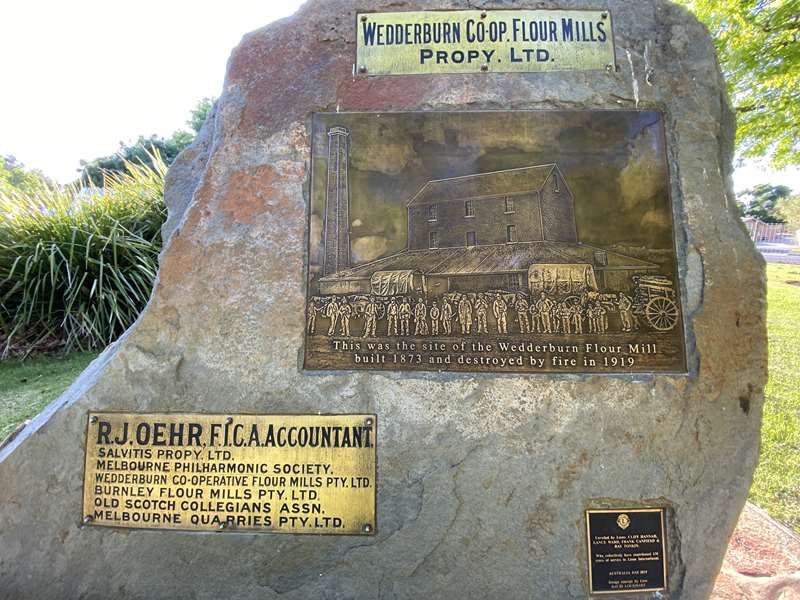Wedderburn - Soldiers Memorial Park


Soldiers Park is a lovely park with many interesting features.
There are picnic tables, BBQs, ceramic sculpture, toilets, shelter with tables, Wedderburn Old Timers Bandstand and Borella Jacka Victoria Cross memorial. There is a playground beside the park.

On the footpath is a time capsule which the Wedderburn Lions Club in conjunction with the Loddon Shire sealed in March 2018.
Borella - Jacka Victoria Cross Commemorative Sculpture

The Borella - Jacka Victoria Cross Commemorative Sculpture commemorates Albert Borella and Albert Jacka both of whom were awarded the Victoria Cross (V.C) for their actions during World War One. Both men grew up in the former Shire of Korong.
Albert Chalmers Borella, VC, MM (1881-1968) was an Australian recipient of the Victoria Cross, the highest award for gallantry in the face of the enemy that can be awarded to British and Commonwealth armed forces. Born in Victoria, Borella was one of 64 Australians to receive the Victoria Cross for their actions during World War One , doing so while serving with the 26th Battalion around Villers-Bretoneux in July 1918.
Albert Jacka, VC, MC and Bar (1893-1932) was the first Australian to be decorated with the V. C. during World War One, receiving the medal for his actions during the Gallipoli Campaign. He later served on the Western Front and was twice further decorated for his bravery.
Lieutenant Albert Chalmers Borella VC, MM, MID
Born at Borung, Victoria near Wedderburn, on the 7th August 1881
Raised in the Borung District, schooled at the Borung and Wychitella South state schools
Died in Albury, New South Wales on the 7th February 1968
The Victoria Cross was awarded in recognition of exceptional gallantry and devotion to duty during operations at Villers-Bretonneux, France, on the 17th July 1918.
"For most conspicuous bravery in attack, whilst leading his platoon with the first wave Lt. Borella marked an enemy machine gun firing through our barrage. He ran out ahead of his men into the barrage, shot two German machine-gunners with his revolver, and captured the gun. He then led his party, now reduced to ten men and two Lewis guns, against a very strongly held trench, using his revolver and later a rifle, with great effect, causing many enemy casualties.
His leading and splendid example resulted in the garrison being quickly shot or captured. Two large dug-outs were also bombed and thirty prisoners taken. Subsequently the enemy twice counter-attacked in strong force, on the second occasion outnumbering Lt. Borella's platoon by ten to one, but his cool determination inspired his men to resist heroically, and the enemy were repulsed with very heavy loss.
Lt. Borella also served six years in the Australian Army during World War Two, rising to the rank of Captain. He then settled in Albury where he was buried with full military honours. He continued to visit family in the Borung district until three years before his death.
Lieutenant Albert Chalmers Borella VC, MM, MID
Born near Winchelsea, Victoria on the 10th January 1893
Raised and schooled in Wedderburn, Victoria
Died in Caulfield, Victoria on the 17th January 1932
Bert Jacka enlisted in the 14th Battalion AIFin September 1914, aged 21. He went ashore at ANZAC Cove on 20th April 1915. On 19th May 1915, at "Courtney`s Post" he recaptured a portion of trench line taken by the Turks and single handedly killed seven of the enemy and he became a national hero when he was awarded the Victoria Cross, the first to an Australian in World War One.
In August 1916 at Pozieres, Jacka`s position was overrun. With only a handful of men he led a counter-attack and was wounded numerous times. He was inspirational during fierce hand-to-hand fighting and with the help of other Australians the ground was retaken. For this "individual audacity" Jacka was awarded the Military Cross. In April 1917 Jacka received a Bar to his Military Cross, for his bravery during the action at Bullecourt and for capturing an enemy patrol. His Battalion became known as "Jack`s Mob".
In 1918 Jacka was badly gassed, which effectively ended his military career. In Oct 1919 he returned to Melbourne to a grand reception. On the 28th Oct. 1919 he returned to his family in Wedderburn where he announced he was making Melbourne his future home. He established an electrical goods business and was elected Mayor of St. Kilda in 1930.
He died on the 17th January 1932 due to his war injuries.
Soldiers Memorial Park History
The Wedderburn Flour Mill occupied this land until destroyed on March 6th 1919.

The site was sold by auction to a syndicate for 975 pounds on April 18th 1919, then it was resold in lots. The R.S.L. bought the S.W. corner for 140 pounds, the money being advanced by Messrs Gould, Burge and Hendry with the intention of erecting a Soldiers Memorial. (The Bowls Club brought the Eastern portion of the site and made a 3 rink bowling green.) The chosen design was costal at 475 pounds, which including erection and gold lettering. The basic stone is Harcourt granite.
Mr. John A Craig suggested a queen competition to raise funds and the girls were Miss Shirley Haase, Queen of Peace who raised 45 pounds and 13 shillings. Miss Winnie Guthrie, Queen of the Diggers who raised 227 pounds, 6 shillings and 9 pence. Miss Annie Willis, Queen of the Harvest who raised 178 pounds, 8 shillings and 2 pence. The total raised - 451 pounds, 7 shillings and 11 pence - was 44 pounds short of the cost.
On Anzac Day 1921 the Queen of Queens, Miss Winnie Guthrie unveiled Wedderburn Soldiers Memorial. The Jacka Memorial Gates were opened on April 6th 1958 in the presence of 2500 people. The 14th Battalion (Jack's mob) was represented by 30 of its veterans who with member of the local R.S.L marched from the Shire Office to the park led by Wedderburn Brass Band and the Pyramid Hill Pipe Band. Captain Beamond M.C unveiled the gates and the 14 Battalion's Padre, the Very Rev Sir Francis Rolland, CMC, OBE, MA dedicated the gates.
Bert Hinkler's Lamp
The finding of Bert Hinkler's body coincided with the time when the Korong Shire Council was about to erect the 2-bulb lamp, which the community had requested for illumination in the gardens. The Council made an immediate decision to dedicate the lamp to the distinguished airman.
Photos:
Location
67 Calder Highway, Wedderburn 3518 Map









